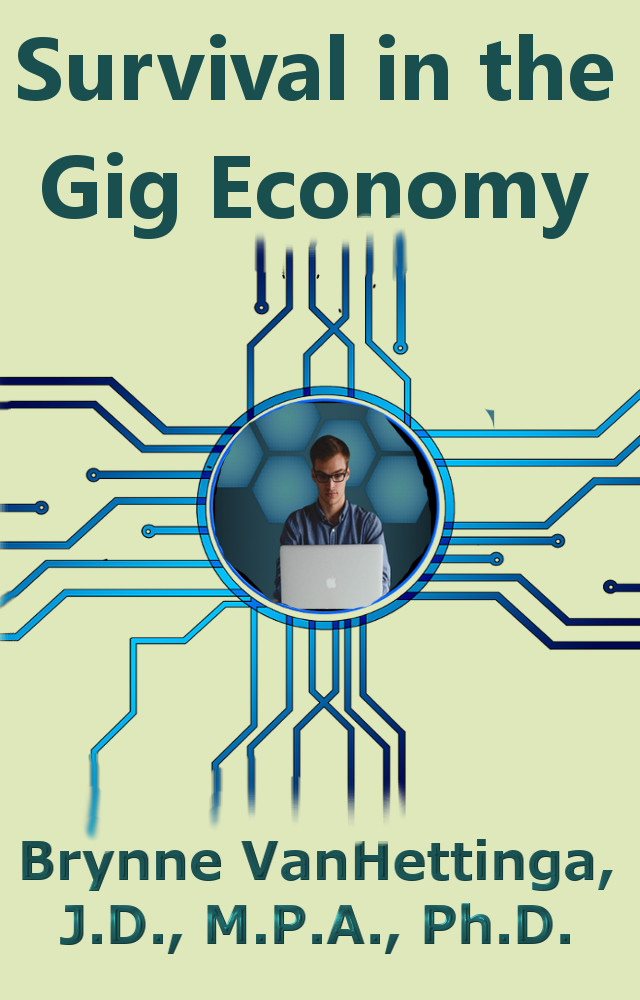
Survival in the Gig Economy
Freedom from the nine-to-five or another form of exploitation? The gig economy is both!
Book gives you the truth about about what to expect and helps you make a plan when nothing is predictable.

Freedom from the nine-to-five or another form of exploitation? The gig economy is both!
Book gives you the truth about about what to expect and helps you make a plan when nothing is predictable.
The question “Who are you” so frequently implicates “What do you do”? Yet, the elevator pitch that we so fretfully carefully craft in order to insure that our personal “brand” is acceptable to the corporatocracy often does not truly describe who we are.
Why do I write? I write to understand. I write to bring important research that is frequently hidden behind paywalls into the consciousness of the “average” person. Those of us who are tired of working harder for less, year after year, and wonder WHY? Even more problematic is why we so willingly acquiesce to our own abuse? We are abused by a system that views us only as cogs in the wheels of “production,” paying us the minimal they can get away with legally (and sometimes not legally) while at the same time bombarding us with messages to spend the money they don’t want to pay us on things we don’t need and may not even want.
So. who is Brynne VanHettinga? I don’t even have a recent, decent digital photo of myself. The only photo I have was done by a paid professional photographer years ago–when I was finishing up my doctoral dissertation while caring for a dying husband. My hair is dyed to cover the natural gray and the photo looks way too “corporate.” Based on the advice of job clubs, career “change managers” and nearly everyone else–you had to project an image of corporate conformity. You also had no chance of getting an interview, let alone hired, if you were a “grayhead.”
![]() So, I have a computer-generated avatar and not a photo. While it still looks way younger than I do in real life, the algorithm at least had the option of gray hair–which is more than I can say for the job “market.” Those folks who absolutely must have the “resume” version can visit my LinkedIn page.
So, I have a computer-generated avatar and not a photo. While it still looks way younger than I do in real life, the algorithm at least had the option of gray hair–which is more than I can say for the job “market.” Those folks who absolutely must have the “resume” version can visit my LinkedIn page.
Because my personal ethics create an aversion to serving the corporatocracy, the options left are state and local governments and non-profits. There are a number of high-profile non-profits doing good work and whose mission is compatible with my own moral values. However, they tend to be located in extremely high-cost urban areas (New York, Washington, D.C., San Francisco). As a practical matter, working at a non-profit in these places, you are either going to live in a rathole in a dangerous neighborhood or spend half your life commuting. Since the so-called Great Recession of 2007-2009, state and local governments are, for the most part, broke–so they tend to be laying off or letting positions go unfilled rather than hiring.
A lady who ran a non-profit in South Austin (and for whom I did a very small “free”-lance project) said she would love to hire me, but I would have to find my own grant funding. Thus we have the paradox of educated people out of work while acute human needs go unmet because there is no money for care and social justice work. Yet, there are fortunes to be made finding ways to make even more money for rich people. This is not just a jobs problem, or an economics problem. It is a moral problem.
For those of you who like data, my Meyers-Briggs type is INTJ, or the “scientist.” INTJs dislike artificial limitations, and believe everything should be open to questioning and re-evaluation. Although INTJs tend to be data-driven, they are also open to alternative ideas and multiple contingencies (i.e., they are not rigid and dogmatic). The INTJ is the second rarest (after INFJs at 1.5%) of the personality types, comprising some 2.1% of the total population. INTJ females are especially rare, at just 0.08%.
In addition to a rare personality type, in 1988 I took a couple of IQ tests and was admitted to membership in Mensa. I am not technically a member of Mensa now, only because I have moved multiple times and not paid dues for over a decade. But I could technically “rejoin” by paying dues. In order to be accepted into Mensa, one has to score in the top 98% on one of the IQ tests they make you take. I scored at 98% on one test and 99% on the other. This is not so much to brag about how smart I am, but to let folks know that I occupy a very small group on two separate variables. That is, the probability that you might know someone like me is around (0.008) x (.02) = 0.016%, or 0.00016.
Politically, I am Independent, or what some states call No Party Affiliation, or NPA. I tend to favor minority parties on specific issues (e.g., the Working Families Party on jobs, Libertarians on civil liberties, and Greens on the environment), mainly because these smaller parties have not been captured by the corporatocracy. I hardly ever vote “straight ticket” where all the candidates belong to a single party. According to the PEW Research Center, only 7% of voters have no partisan preference.
However, I abhor Trump and Trumpism (which I often equate with narcissism, bullying, reality-denial, White supremacy, and fascism–which I also consider to be distinct from traditional Republicans). This might slide me more towards the “leans democratic” cohort of Independents, which the Pew Research Center figures is about 17%. So, splitting the difference, I might “share” political views with about 12% of voters. This now puts the probability of meeting a person like me at 0.00192%.
You might be asking why I am telling you this. Why don’t I try to convince you that my message is universal–that “everyone” will want to buy my books? Which brings me to probably the most important facet of who I am: I tell the truth and follow my own moral compass. I will not lie or deceive to “make a sale” or otherwise gain some unfair advantage. The down side of this is that I thoroughly suck at marketing and self-promotion. Which means that I have trouble relating to the cultural narcissism of “branding,” as well as difficulty understanding why so many others swallow the BS that the “system” is constantly shoving into our consciousness.
Which leads back to why I write. I want others to know the truth. While the “truth” should be based on a foundation of facts, research, and data, it also should not be disconnected from our moral teachings and our faith traditions. If we don’t understand where we are, how we got here, and why, we won’t ever be able to figure out where we are going.
In the same spirit of frankness then, who are the folks most likely to enjoy my books? You don’t necessarily have to be an INTJ, have a Mensa-level IQ, or be politically independent, but you likely have some higher education, an open mind, and prefer to think for yourself. You have a sense of curiosity, along with a healthy dose of skepticism. You also have some nagging (if barely conscious) sense that things are not right–and the “not right” is more (and more complicated) than the bogeyman-du-jour we may hear about in the corporate media.
You are not afraid of new ideas, new ways of thinking and seeing the world. You are not afraid to work your mental muscles because you know the simple and “easy” answers are probably not the right ones.
You are not afraid to speak truth to power, and may even have done so at various times in your life.
You would like approaches to contemporary problems framed more in terms of “we” and less in terms of “me.” That is, you believe in respecting individual differences while at the same time acknowledging that we have collective responsibilities to society as a whole.
You intuitively understand that the world does indeed look different from where you stand. This is not so much due to the “observer effect” we learn about in physics, but a sociometric one. Those with power and privilege do indeed see and experience society differently than those who are marginalized, precariatized, and inferiorized by society.
You want to make a difference and are unsure about how to go about it–especially if you are coming from a place where resources are limited.
You may be seeking a nonjudgmental space where like-minded folks can build community along with brainstorming for a better future.
